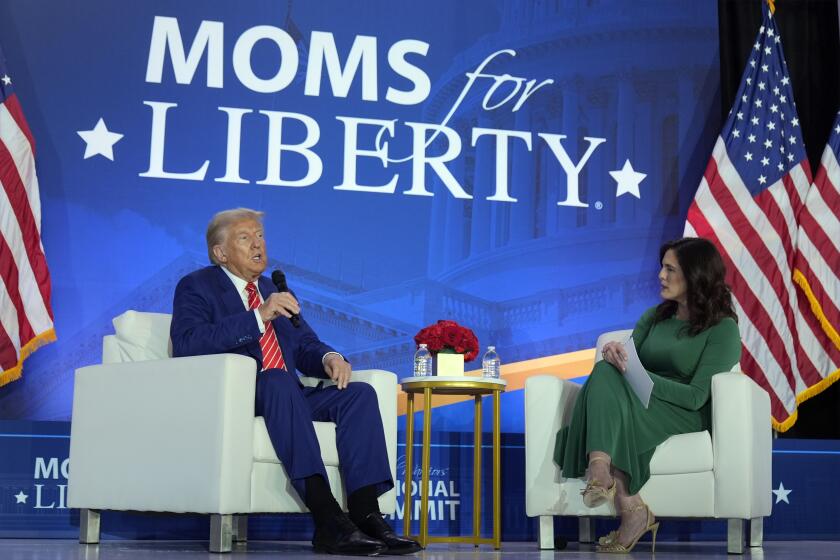CAPITOL JOURNAL : Wilson Relishes Added Role in Party Politics
Shortly after he was elected governor, Pete Wilson collared an assemblyman in a hotel room and implored him to run for the state Senate as the GOP’s best hope for preserving a vacant Republican seat.
“I had decided I probably wouldn’t run, but the governor’s urging made the difference. If he hadn’t encouraged me the way he did, I wouldn’t have run,” said Assemblyman Tim Leslie (R-Carmichael), now the front-runner in a March 19 special election.
About the same time Wilson was lobbying Leslie, he also recruited a loyal political supporter, Long Beach businessman Ron Cedillos, to run for the No. 2 post in the state party, an automatic steppingstone to the chairmanship. Faced with unanticipated conservative opposition, the governor recently reversed directions and advised Cedillos to bow out of the contest in favor of a former chairman, Tirso del Junco, a Los Angeles physician.
But Wilson’s forceful moves in both the legislative and party races illustrate a significant contrast between the new governor and his fellow Republican predecessor, George Deukmejian: an eagerness to play a strong role in politics. He means to do it at all levels, from local to national.
“This is a political office. You’re going to see a different style,” said Wilson’s veteran chief of staff, Bob White. “A governor can’t ignore the politics of the job, in a job that requires political skill.”
Wilson has set up a political operation in the governor’s office and although it is not nearly as extensive as the President’s elaborate political apparatus in the White House, he clearly has the Washington model in mind.
“Deukmejian was noted for his caution and playing defense,” said one Wilson strategist who did not want to be identified. “We like to play offense. You can’t score without the ball.”
Heading up the governor’s in-house political operation will be an unrelated namesake, Marty Wilson, 36, a trusted campaign aide who specializes in the nuts and bolts of politics. When Marty Wilson speaks of “infrastructure,” he is not talking about bridges and aqueducts, but of computer lists of swing voters and small contributors. “We (the Wilson camp) have spent a lot of time and money investing in infrastructure,” he said.
Marty Wilson supervised Pete Wilson’s highly successful, $6-million get-out-the-vote effort last year and afterward organized his inaugural festivities. Now he is the governor’s deputy chief of staff, but just as accurately could be called “political director.”
His duties include watching out for the governor’s interests within the party, both in California and nationally, being on the lookout for good candidates to recruit and support, devising reapportionment strategy and generally helping to build a Wilson political machine.
All this gets into murky gray areas of legality when taxpayer money is used. “Ethically, legally, politically, there are some things you can’t do on the public payroll,” said Wilson’s longtime communications director, Otto Bos. “So you have to have an outside political operation. Marty will be Mr. Inside. George (Gorton) will be Mr. Outside.”
On one of the most experienced political teams ever to operate in California, the aide who ranks second only to White on the seniority list is Gorton, 43, the manager of Wilson’s Senate and gubernatorial campaigns. Indicative of how involved the governor intends to be politically, Gorton recently moved his family and his political consulting firm from San Diego to the Sacramento foothills in anticipation of ample Wilson-generated business financed with private money.
Gorton calls politics “the real world” and says “it’s extremely important” that the governor be an active player.
“This is politics as well as government that we’re doing up here,” Gorton said. “Pete needs to provide real leadership to the Republican Party. . . . In order to enact his programs, he needs support--public support and more Republicans to support him in the Legislature and Democrats to realize how popular he is with the people so they will take him seriously.”
Wilson’s pollster, Richard Dresner, also is moving from New York to California to be near the governor.
California’s most venerable political consultant is Stuart K. Spencer, and he goes even further back with Wilson than White does. An original member of the Wilson political family, Spencer has been offering the new governor friendly advice for nearly 30 years. When Wilson makes his big political decisions, Spencer invariably is in the inner circle--as he also was with Ronald Reagan, whom he helped elect governor and President.
Spencer, who speaks from bitter firsthand experience, said that despite initial good intentions “there’s a historic problem, the palace guard problem” that tears apart political teams after a candidate is elected and takes office. Jealousies sour relationships between turf-conscious aides who often divide up between “insiders” (such as White, Bos and Marty Wilson) and “outsiders” (Gorton, Dresner and Spencer).
“It’s generic, they want to cut you off,” said Spencer of the “insiders.” But he confidently predicted “this will never happen in this Administration because we have a cohesive team. We all understand we have to stick together. There’s great chemistry.”
Spencer added, “Pete tends to like politics. He’ll be more involved than George (Deukmejian).”
Deukmejian approached politics, as most things, with caution. He admonished aides to dock themselves pay when they strayed into political activity during normal work hours. Rarely did he try to recruit candidates or make endorsements in primaries. He helped a limited number of GOP nominees raise money in general elections, but not nearly as much as legislative leaders would have liked. He seldom tried to exert any influence in national party affairs.
“We didn’t do the kinds of things a governor should do politically; we didn’t get it done,” said Sal Russo, who was Deukmejian’s political aide during the first two years of his Administration. Russo never was replaced after he left Deukmejian to form a political consulting business.
By contrast, Russo says that Gov. Reagan, whom he also worked for as a young aide, “had an awesome (political) machine. . . . When we had special elections, we could marshal forces and we could do it because of the governor.”
Wilson began marshaling forces in a special state Senate election even before he was inaugurated governor. The contest, in a sprawling Northern California district, will decide a successor for Republican John Doolittle of Rocklin, who was elected to Congress in November. This is particularly crucial because if a Democrat should win, that would give the Democratic Party a two-thirds majority in the Senate and the opportunity to cause all sorts of mischief, from a Republican standpoint.
So Wilson and Senate Republican Leader Ken Maddy of Fresno corraled Assemblyman Leslie in a hotel meeting room at a GOP retreat in Palm Springs and talked him into running. The governor-elect pledged not only a public endorsement in the primary but fund-raising help.
“Party leadership works better when the governor is active politically,” Maddy said. “Legislators are happy about it. . . . The only people who have a real ability to generate (political) money are the governor and the President.”
Assembly GOP Leader Ross Johnson of La Habra said: “In the mind of the typical voter, Pete Wilson now is the titular head of the Republican Party in California. With that comes certain responsibilities to be aggressive (politically). My sense of things is that he will be.”
Assemblyman Pat Nolan (R-Glendale) said: “Deukmejian didn’t like to battle. Wilson is a battler. This will be a refreshing change.”
More to Read
Get the L.A. Times Politics newsletter
Deeply reported insights into legislation, politics and policy from Sacramento, Washington and beyond. In your inbox three times per week.
You may occasionally receive promotional content from the Los Angeles Times.







